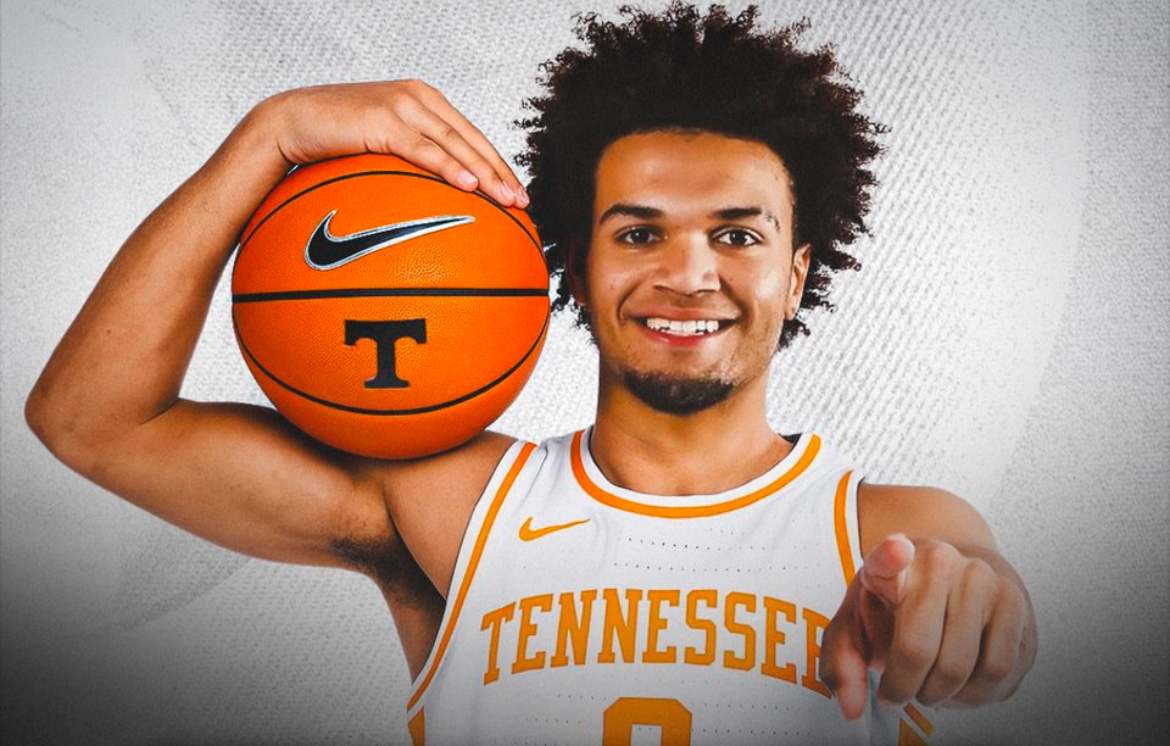In an unexpected turn of events, Ja’Kobi Gillespie, a star player for the Tennessee Volunteers Men’s Basketball team, has made waves in the college basketball world by turning down a remarkable $7.5 million in NIL (Name, Image, and Likeness) offers from powerhouse programs like Georgia and Notre Dame to remain with the Vols. His decision has sent shockwaves through the sports world, not only because of the financial magnitude of the offers but also due to Gillespie’s clear commitment to his team and school. This move challenges the conventional narrative that NIL deals are the key driving force behind recruitment and transfers in college basketball.
Gillespie, a standout guard for Tennessee, had been one of the most coveted players in the transfer portal following his breakout season. His combination of scoring ability, court vision, and leadership had caught the attention of multiple high-profile programs, and it was widely expected that he would capitalize on the massive NIL opportunities being offered to him. The $7.5 million deals from Georgia and Notre Dame were certainly tempting—monumental figures that would set Gillespie up financially for life. However, in an exclusive statement, Gillespie shocked both fans and analysts when he declared his intention to stay with the Tennessee Volunteers, expressing his dedication to the program with the declaration: “I plan to be a Vol forever.”
This surprising decision is indicative of the broader shifting landscape of college athletics, particularly basketball. The introduction of NIL rights has allowed athletes to profit from their personal brand in ways that were previously unimaginable. While this has been a game-changer for many, Gillespie’s move shows that loyalty and a sense of connection to a program can still influence a player’s choice, even in an era where financial incentives play such a prominent role in decisions.
Gillespie’s statement revealed a deep sense of personal and emotional attachment to Tennessee. “This place has given me so much. The coaches, the fans, the community—it all feels like family. I’m committed to making this program the best it can be, and I want to help lead us to a national championship,” Gillespie said. His words underline a larger trend among some student-athletes who are choosing to stay with their teams, valuing the opportunity to build a legacy over immediate financial gain.
For Tennessee, Gillespie’s decision is a massive victory, not only from a talent standpoint but also in terms of recruiting. His choice to turn down such a lucrative deal demonstrates that the Vols are building something special in Knoxville, and that players are willing to stay put for the long term if they believe in the vision set forth by head coach Rick Barnes and the rest of the coaching staff. Barnes, who has earned a reputation as one of the top coaches in college basketball, expressed his pride in Gillespie’s commitment. “Ja’Kobi is the heart and soul of this team. His decision to stay is a testament to his character and his love for the University of Tennessee. We couldn’t be more excited to have him back,” Barnes said in a statement.
The fact that two major programs—Georgia and Notre Dame—offered Gillespie such eye-popping deals speaks to his market value as one of the premier talents in college basketball. These programs, known for their strong basketball traditions, clearly saw Gillespie as a key piece for their future success. However, the emotional connection he has with Tennessee proved to be more compelling than the financial allure of playing elsewhere. His decision could inspire other players to think more deeply about the intangible benefits of staying with their programs, such as building team chemistry, cultivating loyalty, and the potential for long-term success beyond the game itself.
Gillespie’s decision to turn down $7.5 million also raises questions about the long-term effects of NIL deals on the college sports landscape. While NIL has undoubtedly revolutionized college athletics by providing student-athletes with opportunities to profit from their name, image, and likeness, Gillespie’s commitment to Tennessee is a reminder that the core values of college sports—team loyalty, personal growth, and building a lasting legacy—still matter to some players.
In conclusion, Ja’Kobi Gillespie’s decision to turn down significant NIL offers from Georgia and Notre Dame and remain with the Tennessee Volunteers speaks volumes about his character and dedication to his team. It challenges the prevailing notion that financial incentives are the primary drivers of athletes’ decisions in the modern era. By prioritizing loyalty and his desire to contribute to Tennessee’s success, Gillespie has cemented his place as a leader not only for the Vols but as an influential figure in the evolving landscape of colleg
e basketball.
